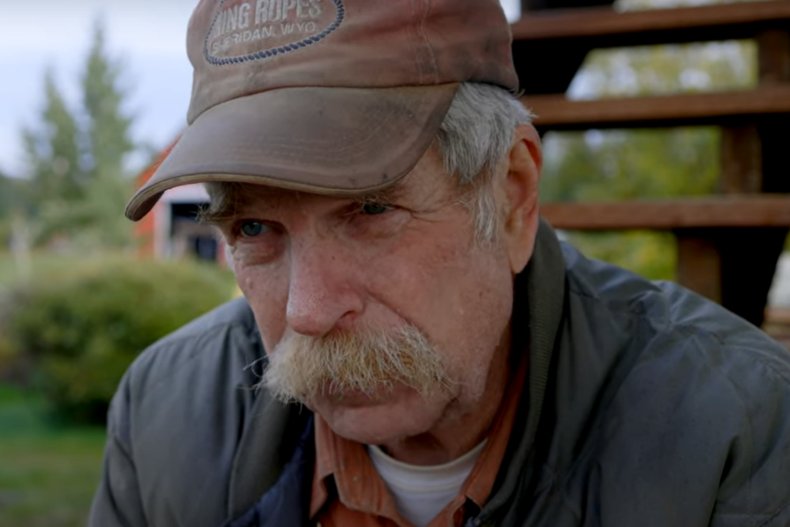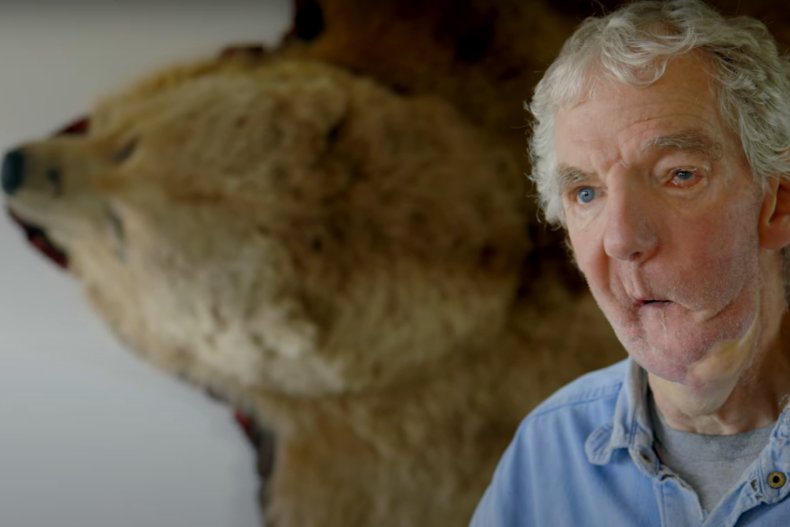Man Who Had Face Torn Off by a Bear Had To Dig Debris From His Own Airway
Few things are more terrifying than the prospect of being attacked by a bear in the Alaskan wilderness. Wes Perkins, a 65-year-old former fire chief, not only lived to tell the tale, but wants to help anyone else who has gone through something similar.
In 2011, Perkins had his face ripped off by a grizzly bear in what has been described as one of the most horrific attacks on record.
Perkins, from Nome, Alaska, his friend Dan Stang, and Dan Stang’s son, Edward Stang, were out in the mountains on a hunting trip. They had spotted a grizzly bear in the distance, and began tracking it, but at some point, lost sight of the creature.
Out of nowhere, the bear reappeared—much closer than they had thought.

iStock / Getty Images Plus / Donnie Rosie on Youtube
“I turned and saw the bear, full charge,” Perkins told Anchorage Daily News around a year after the attack. “I only had time to say, ‘Oh s***!’ But I got [my] gun [halfway] off my back… When I turned around, the bear was that close. I had no time to do anything.”
The bear began to maul Perkins, severely disfiguring his face. The attack has now become the subject of a short documentary by filmmaker Donnie Rosie, who was in Alaska for another project when he found out about Perkins’ story.
“I look back and the bear’s on top of [Perkins]”, Dan Stang told Rosie in the film.
Dan Stang said that he immediately grabbed his gun and started shooting the bear. The 8-foot-tall bear then began to charge at him, leading his son to start shooting at the bear too. Eventually, the bear succumbed, and eventually died.
“I probably saved Wes’s life and my son saved my life in the same ordeal,” Dan Stang said.
Throughout the attack, Perkins had remained conscious. Dan Stang had rolled him forward so that his injured face was buried in the snow to keep it numb, and radioed for immediate help.
“I basically kept my airway open and had to dig the debris out of my airway, when I lost my tongue, jaw and all but a few teeth,” Perkins told Newsweek. “So telling myself to function and never close my eyes or go unconscious was the main concentration.”

Donnie Rosie on Youtube
Serendipitously, the first person to respond was Perkins’ brother, who swiftly contacted a rescue helicopter, piloted by Ben Rowe.
“I was lucky enough that I was able to get up, with their help, and walk into the helicopter,” Perkins told Donnie Rosie in the video.
He was then rushed back to Nome, and then to Harborview Medical Center in Seattle.
“I had no airway unless I kept my head tilted to the side just right,” Perkins told Newsweek. “I have helped others my whole life, and never imagined that I would be on the receiving end of things, but the brotherhood of Nome, my brothers in the fire service, from Seattle, Anchorage, Nome, came out to support and fundraise for me and helped me through this recovery.”
The bear had ripped off most of his jaw and tongue, and caused huge damage to one of his eyes.
Perkins spent the next four months in hospital, undergoing numerous operations to repair the damage done by the bear. Slowly, the surgeons began to reconstruct his face, inserting titanium plates in both his cheeks and a titanium rib around the jawbone.
“I have what is called a fibula bone graft,” Perkins told Newsweek. “They took my left fibula from the lower leg and made a jaw out of that and inserted it in place of what I had lost. So it was a big surgery with lots of surgeons doing their part and I had the best care a person could ever ask for.”

Donnie Rosie on Youtube
Perkins couldn’t speak legibly for several months, relying on writing to communicate. The extent of his injuries led doctors to tell him that he may never be able to eat or drink via his mouth again.
“I have a few issues sometimes with talking, as most of my damage was facial, lower jaw, but most understand me if I slow down and do not get excited,” Perkins said. “I used to talk a lot, and when they told me I would never talk or eat by mouth again, I really had to beat those odds as I could not imagine my active life without being able to do either.”
The painkillers that he was given began to become addictive, Perkins said, but his family and friends supported his efforts to wean himself off: “I was on morphine, and opiates and methadone in my recovery. The day I left the hospital they told me I was addicted or dependent on opiates. So I spent a couple of months at home that fall putting myself through the ‘Wes Perkins Opiate Withdrawal Clinic.'”
“I did not like the feeling of being high or on opiates, I was never a drug user, never had any major medical problems before I was mauled. So I was lucky I was able to put myself through this at home. I know how people cannot function or hold-full time jobs, raise families while in this state, as there was no way I could do that and go through withdrawals. I had tremendous family and friend support.”
Darcee Perkins, Perkins’ daughter, told Newsweek: “Not any person would have survived this or continue to today—I couldn’t have. His will to survive and keep going, stay positive.”
Over ten years later, Perkins’ face is healed, though scarred, and he lives a full and happy life. He hasn’t let his ordeal deter him from exploring the wilderness, and still hunts bears and moose like he did before.
“[I] do most everything I used to do but since I cannot close my mouth, I cannot swim and it’s hard to run or jog, as my jaw bounces because I lost so much muscle in my jaw… but hell, those are small things in life. I do everything else.”
He dedicates a lot of his time to communicating with other mauling victims, helping them get through their recovery.
“A couple of years after I was mauled, I received a letter in the mail from a cousin of a man in his mid-30s who was hunting elk with his father when he was mauled,” Perkins told Newsweek. “He was also sent to Harborview in Seattle, where I spent three months recovering. They wanted help if I was willing to help give them some direction as to what may happen. He too had mostly facial damage, but did not lose eyesight, or his jaw, lower chin, like I did.”
Since then, others have contacted Perkins for help and advice. “In September, [another person] was mauled by moose while hunting with a buddy. He too survived, most of his injuries were wounds, on the torso, leg, etcetera. He spent two months recovering in Anchorage,” Perkins said. “I messaged him within days, helping him through this. It’s hard to imagine the recovery, and the person has no idea what to expect or how long the process will be. So I would message him when he was in pain, to help him through the process.”
“I do what I can to pay it forward, and have always had a positive attitude.”
Do you have an animal or nature story to share with Newsweek? Do you have a question about surviving bear attacks? Let us know via science@newsweek.com.

Comments are closed.